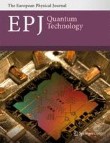Guest Editors:
Rhys Lewis
National Physical Laboratory (NPL), Teddington, United Kingdom
Mark J Everitt
Quantum Systems Engineering Research Group, Department of Physics, Loughborough University, United Kingdom
Many national governments around the world are investing significantly in the potential for economic growth and increased opportunity based on new systems, products and services using the quantum properties of materials. These properties are best described by the equations of quantum physics and the resulting devices and systems are collectively known as quantum technologies.
These include the increased sensitivity of quantum sensors and imaging devices, the increased precision of quantum clocks, the increased security of quantum communication, and the increased power of quantum computers.
As those technologies near market there needs to be a parallel increased focus on building a solid industrial base, including the creation of new standards and possible new regulations to form part of the developing industrial and commercial landscape for quantum technologies.
Standards will play an important part in enabling integration of quantum devices into wider complex systems. The existence of standards supports the test and measurements needed for validation of quantum enabled measurement systems and procedures. By achieving global agreement on how measurements should be made, expressed, and used, we can be sure that measurements will be stable over time, comparable with others and accurate, allowing known confidence in measurement results.
In this topical collection, we invite authors to submit contributions which describe (for a wide audience) recent work towards the development of new standards for quantum technologies. In particular, authors from industry and applied research organizations, but also from academia, are invited to submit contributions that fit this theme. The editors are interested to see any articles which are supportive of a measured approach to standardization; enabling innovation while not restricting creativity.
Please refer to the journal’s Submission Guidelines for the preparation of the manuscript.
Important: Upon submission please select the appropriate article type (i.e. Research, Review, Comment or Brief Report) and the topical collection from the "Collection" drop-down menu under the "Details" tab.
The guest editors together with the Editor-in-Chief, will oversee the editorial and peer-review process. Accepted articles are published open access and automatically assigned to a volume and issue after the proofs are corrected. They will be accessible through the regular volume and issue, as well as collected online under their dedicated special collection page.
- - - - - - - - - --
